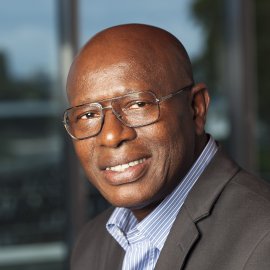History, Cheikh Anta Diop University, Senegal

Octobre 2015 à Juin 2016
Babacar FALL is the Director of the research laboratory named “Centre de recherche sur les métiers et la mémoire en Afrique” (Research Center on occupations and memory in Africa) affiliated to the Doctorate School of Social Sciences (ETHOS) at Cheikh-Anta-Diop University in Dakar, Senegal. He had been the Chair of the History and Geography Department of the FASTEF (School of Education of the Universite of Dakar. Holding a doctorat de 3ème cycle in History (1984), he received his Ph.D from the University of Amsterdam (The Netherlands) in 2010. In 2008 he was bestowed an honorary doctorate by the University of Le Havre. His research areas include the labor history in Francophone West Africa, the migrations, the innovative educational reforms in Senegal. As an academic activist, he is leading a Non Governmental Organisation (Le Groupe pour l’Etude et l’Enseignement de la Population) which is well known as a platform for pedagogical innovations and an advocate for youth leadership capacities building. As a researcher, he received several fellowships (the Fulbright Senior Research, The Savage Award of the University of Oregon (USA), The Stanford Humanities Center (USA), the International Research Center Re:Work of Humboldt University, in Berlin (Germany).
"Vulnerable Youth on the Edge of the Labour Market. A Case Study of Senegal"
This research covers the period from 1990 to 2010 that corresponds to the era of the so-called structural adjustment programmes, which took their heaviest toll among young people and women. The effects observed among young people, who no longer enter the labour market and feel trapped in a long transition from childhood to adulthood, offer an entry point for the work. A substantial number of these youth lack self-confidence and choose to either settle for subsistence living or brave the Sahara Desert and Atlantic Coast hoping to reach Europe. These “Youth-At-Risk” are the subject of this project which attempts to provide a key to understanding the tragedy they experience on a daily basis. With an eye on the long term, and using history, sociology as well as oral testimonies from various actors, this research on vulnerable youth on the edge of the labour market attempts to shed light on the options decision makers can take to better respond to the development needs of African societies.